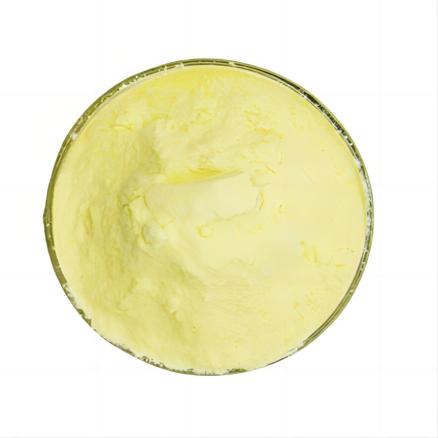La vitamina K3, también conocida como menadiona, es una forma sintética de la vitamina K. No suele utilizarse como suplemento dietético ni añadirse a los alimentos por motivos de seguridad.


Vitamina K3 CAS #58-27-5
La vitamina K3, también conocida como menadiona, es una forma sintética de la vitamina K. No suele utilizarse como suplemento dietético ni añadirse a los alimentos por motivos de seguridad.
La vitamina K3, también conocida como menadiona, es un polvo cristalino amarillo de sabor ligeramente amargo y sin olor característico. Desempeña un papel crucial en la coagulación de la sangre al facilitar la síntesis de ciertas proteínas necesarias para la coagulación. Además, la vitamina K3 actúa como antioxidante, ayudando a proteger las células del daño oxidativo, y se utiliza a menudo en piensos y suplementos dietéticos para promover la salud y el bienestar general.
Funciones y aplicaciones:
1.Forma sintética: A diferencia de la vitamina K1 (filoquinona) y la vitamina K2 (menaquinona) naturales, que se encuentran en los alimentos y tienen funciones específicas en el organismo, la vitamina K3 es un compuesto sintético desarrollado con fines terapéuticos.
2.Solubilidad en agua: La vitamina K3 es hidrosoluble, lo que significa que puede disolverse en agua. Esta propiedad la hace adecuada para su uso en determinadas aplicaciones medicinales e industriales, como en formulaciones y productos a base de agua.
3.Uso médico: Históricamente, la vitamina K3 se ha utilizado en medicina como tratamiento para la deficiencia de vitamina K y ciertos trastornos hemorrágicos. Sin embargo, su uso se ha interrumpido en gran medida debido a problemas de seguridad y a la disponibilidad de alternativas más seguras, como la vitamina K1 y la vitamina K2.
4.Preocupaciones de seguridad: La vitamina K3 se ha asociado a toxicidad y efectos adversos, sobre todo en dosis elevadas. En algunos casos, la ingesta excesiva de vitamina K3 se ha relacionado con daños hepáticos, ictericia y anemia hemolítica (una enfermedad en la que los glóbulos rojos se destruyen más rápido de lo que pueden producirse).
5.Situación reglamentaria: Debido a problemas de seguridad, el uso de la vitamina K3 como suplemento dietético o aditivo alimentario está restringido o prohibido en muchos países. En Estados Unidos, por ejemplo, el uso de la vitamina K3 como suplemento dietético o aditivo alimentario no está aprobado por la Food and Drug Administration (FDA).
6.Alternativas: Las formas naturales de vitamina K, como la vitamina K1 y la vitamina K2, son preferibles a la vitamina K3 para la administración de suplementos dietéticos y con fines terapéuticos. Estas formas naturales de vitamina K se encuentran en diversos alimentos y han demostrado ser seguras y eficaces para favorecer la coagulación de la sangre, la salud ósea y otras funciones fisiológicas.
Our professional sales team are waiting for your consultation.